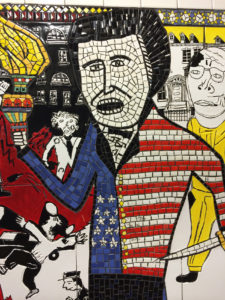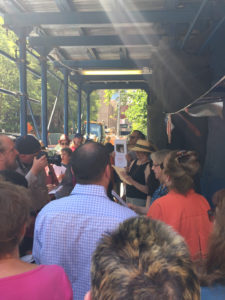
Liberty was a transcendent theme this year for my combined Fourth of July – Juneteenth post. I celebrated Juneteenth at a rally to save an abolitionist house in New York City. I rarely paired these two current holidays. Yet, they are so connected.
With Friends of the Hopper-Gibbons House, historians, and preservationists, we gathered to honor abolitionism and Juneteenth. The house is New York City’s only Underground Railroad site, where enslaved people were sheltered. This was a place where black and white abolitionists sat at the table together to plot and plan their joint mission. The Emancipation Proclamation was also celebrated there. Most importantly, the house is a monument to the 1863 Draft Riots that tore NYC apart regarding the Civil War. Many free black New Yorkers were lynched and attacked, and white abolitionists feared for their lives. The rooftop of this special building and its neighboring row houses provided an escape route from the angry mob. Hopper-Gibbons House is located at 339 West 29th street between 8th and 9th avenues.

Click here for the Chelsea Now article about our activism to save this building. You can also see a photo of me placing patriotic flag buntings on the illegal scaffolds in front of the building. Click here for more news coverage in The Villager.
Liberty and Juneteenth: The more I learn about Juneteenth, the more I see its relevance to Independence Day, from different perspectives, of course. Colonial America sought liberty from Great Britain’s tyranny; enslaved Black folks sought freedom from racist, genocidal, colonized Americans.
Juneteenth for all: Do you think of Juneteenth as a black holiday? Here is one author’s take on why everyone should celebrate it: “We should care because the very fabric of our society depends on our shared religion of inalienable rights. A celebration of freedom for any American is a celebration of the ideals that make our country what it is today. American identity emerged from shared faith in the transcendental ideal of liberty, not from shared blood. Therefore, any celebration of American freedom is a celebration for us all. Juneteenth is about liberty not about race.” To read more, click here.
As a national holiday: Some people believe that Juneteenth should be a national holiday. “There’s just no way around it: There was an irreconcilable clash between the colonists’ war of independence and the freedom of African Americans. Historian Gerald Horne even casts the colonists’ secession as a counterrevolution against the erratic progress of the British Empire to limit slavery. In Brooklyn, New York’s own piece of the Deep South that was roughly one-third slaves, the British army liberated slaves and stationed them in their former masters’ houses. Which side was the revolutionary one? “ To read more, click here.
Freedom, resistance, empowerment: Isabel Wilkerson’s book The Warmth of Other Suns covered Juneteenth’s relevance to the Great Black Migration, an epic freedom, resistance, and empowerment movement: “Juneteenth has been a state holiday in Texas since 1980, and has long been celebrated in California, where many Texans journeyed during the Great Migration. Now, a total of 42 states and the District of Columbia recognize it as a state holiday or special day of observance. Celebrations now often include parades, storytelling, barbecue and red soda pop, prayer and recognition of the elders. The building from which General Granger read the Proclamation all those years late is now a historic landmark. In honor of the last enslaved Americans to be set free.” To read more about the author of The Warmth of Other Suns: The Epic Story of America’s Great Migration, click here.
First black culture holiday: I wrote about Juneteenth from a race and culture perspective. Here’s an excerpt from my post last year: “Juneteenth is our first African American holiday. But it almost did not happen. The word Juneteenth is colloquial phrasing for an approximate June date when enslaved African Americans in Texas learned that they were free. June 19, 2015 marks the 150th anniversary of Juneteenth, also known in Texas as Emancipation Day. But like many black folks, I knew nothing about it growing up in New York. I learned about Juneteenth as an adult while living in Oakland during the eighties.” To read more click here.
Should Juneteenth become a national holiday?